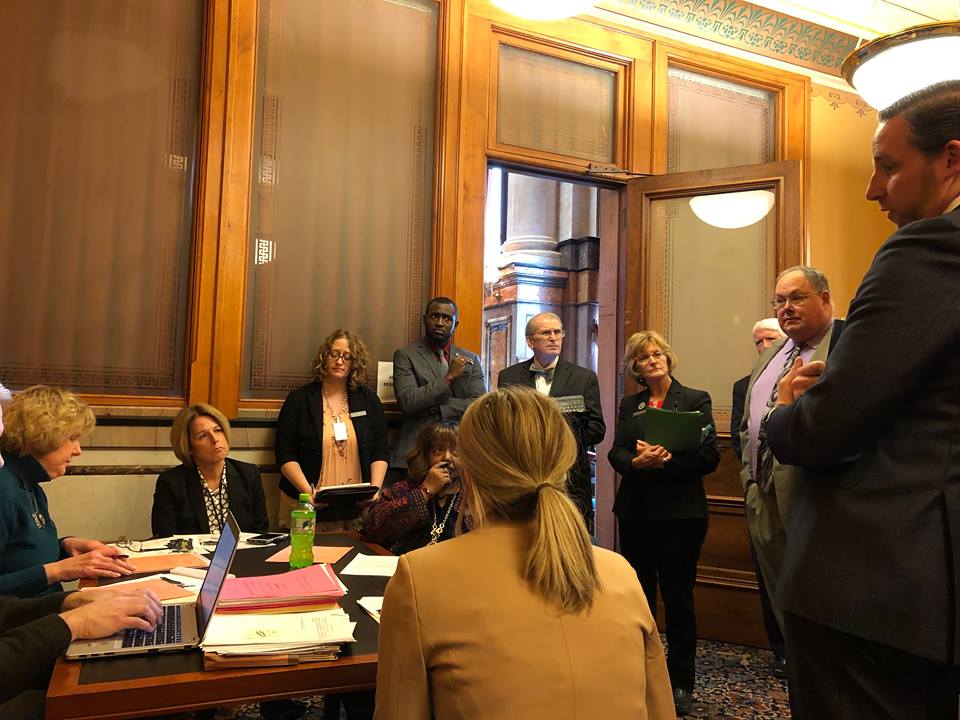House Study Bill 129 did not die Tuesday in its subcommittee, but it didn’t get through either. Representative Mary Ann Hanusa said she preferred to have more time to ask more questions prior to making a decision.
The bill would require school districts and accredited nonpublic schools to offer high school students an opportunity to take the U.S. citizenship and immigration services naturalization civics test.
The opportunity would be offered to all students in grades 9-12. The Director of the Dept. of Education is directed to approve alternative civics tests which may be administered to a child requiring special education or to a student who is identified as limited English proficient.
Sara Allen and David Adelman, both representing Civics Proficiency Institute, spoke in favor of the bill.
Representative Hanusa said it seemed mandating an opportunity sounds like an oxymoron.
“I guess I’m wanting clear language in terms of providing it,” Hanusa said. “I have no problem with our students knowing the information, I think they should. Over the years some of our civics education hasn’t quiet kept up.”
Allen said she’d liken it to any test.
“I guess you could view that as an opportunity for a student to either take it or not take it,” she said. “We think it compliments current Iowa curriculum anyway. Really there’s no teeth to it if they fail it or pass it — it just gives them that opportunity to be familiar with the test and to take the test. I don’t think this would change how a teacher is teaching their civics classes or their history classes.”
Representative Ruth Ann Gaines asked about tests for students who have disabilities or speak different languages and what the potential cost might be.
“Of the 33 states where this has passed, Iowa is the only state that assigned a fiscal note to it,” Adelman said. “The rationale I believe is the ability to translate it into other languages. Des Moines, which you know very well, has 90 different languages spoken in Des Moines Public Schools.”
A Feb. 11 fiscal note estimated the cost of a similar bill in the Iowa Senate to b e $54,200. In December of 2016, the Education Commission of the States issued a 50-state comparison of civic education policies that revealed 47 states, including Iowa, address civic education in state statute. Every state requires students to complete coursework in civics or social studies to graduate.
Adelman noted Internet resources could be used to help with translation.
“Google Translate has the ability to translate into all of those different languages,” he said. “You can go online right now and be in there.”
The Joe Foss Institute offers the civics test free of charge on its website. Foss was a World War II veteran.
“That’s why you see these gentlemen here supporting the veteran community,” Adelman said. “His two visions after he got out of the service were providing services to veterans and also engaging American students in schools on civic engagement. The board is bipartisan and obviously has national interest in moving these issues forward.”
Veterans National Recovery Center is the only other group registered in support of the legislation.
One speaker in opposition from the Iowa Department of Education said in real life the naturalization exam is given verbally and the administrator asks 10 out of the 100 questions.
The exam is updated, Adelman said. Questions are switched out now and again.
Rep. Gaines asked if proficiency in other states that have adopted similar legislation has increased.
Nobody knew.
Eric Goranson with the Iowa Association of Christian Schools spoke in opposition.
“We’re trying to imagine the practical impact on a child,” Goranson said. “You choose to take one test, pass or not, it doesn’t really matter. But the idea that some how taking one test at one point is going to actually solve a single problem is, to us, kind of silly when in reality what you’re doing is just piling on a bad precedent where everybody’s bad ideas on schools being social institutions get tossed into code. We can’t see any measurable benefit.”
Goranson stressed the diverse groups who oppose the bill.
“We’re the Iowa Association of Christian Schools where kids still do the Pledge,” he said. “My kids have to memorize the presidents in order. It’s not like we don’t care about civics. We feel it sets a dangerous precedent to fix a problem it’s not going to fix.”
Allen stressed the test should be looked at as just one tool. She said teachers in other states have used the test on the first day of school and then near the end of the year to see how much knowledge students gained.
Representative Mary Mascher, who did not serve on the subcommittee but did speak, said teachers are already doing that.
“We pre- and post-test all the time,” she said. “Kids are tested to death in our schools. I’ll tell you if we had 100 teachers sitting around this table they would verify that. To assume that teachers aren’t already doing pre- and post-tests on all of that curriculum that is required is really unfair.
“I get a little concerned when we keep adding on and adding on to what we expected educators to do without taking anything away.”
Bradley Hudson of Iowa State Education Association said much of the material found in the tests is being taught at some point during high school.
“This exam could be covering material freshman year that we don’t get to until junior year,” he said. “We buy that curriculum because we think it’s the best to meet the requirements for our students. We think we’ve done a pretty darn good job as people who do this for a living to make sure that curriculum is being learned. I don’t think we need to put other assessments in. We don’t think this is needed to keep our civics education at a high standard — we think it’s there now.”
When Goranson pointed out the mix of education groups opposing the bill, he said there’s a reason educators aren’t supporting the legislation.
Adelman responded.
“Every board member of Civics Proficiency Institution is an educator,” he said. “From the former Secretary of Education from President Obama to George Bush. I find it, frankly, I guess, insulting (to suggest) that they don’t rely or get feedback from educators when they’re pushing these pieces of legislation.”
If teachers are already covering this material, Adelman said it shouldn’t have an impact on the classroom.
“Those who aren’t doing it, it gives another tool to utilize in teaching children very important skills that obviously are not being retained into adulthood,” he said. “By no means are we saying that this one test, this one snapshot in time, is going to fix that issue.”












